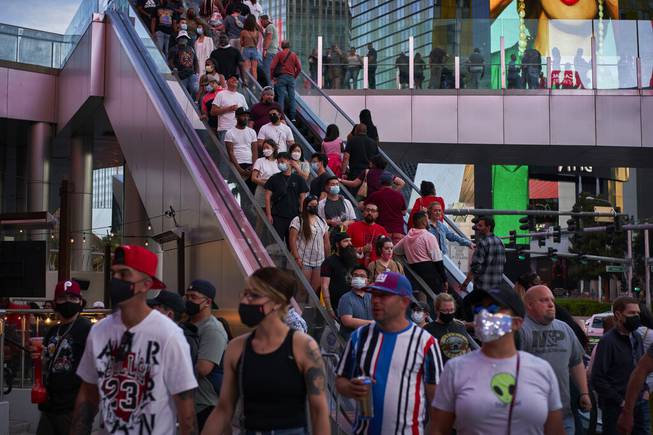
John Locher / AP
People ride an escalator along the Las Vegas Strip, Saturday, April 24, 2021, in Las Vegas.
Tuesday, May 4, 2021 | 7:30 p.m.
CARSON CITY — Widespread vaccine distribution and federal coronavirus relief money have set Nevada on a path toward a quicker-than-expected economic recovery, analysts said Tuesday.
The five members of the state Economic Forum approved projections that suggest the return of tourists to the casinos and resorts that power Nevada’s economy would provide roughly $9.1 billion in general fund revenue over the next two years, which is $586 million more than originally expected.
The budget recommendations will be used by lawmakers in crafting the state’s budget in the waning weeks of the legislative session. Under the Nevada Constitution, the state’s budget has to be balanced, so lawmakers have until the end of the month when the session concludes to finish drafting the budget.
The revenue will allow lawmakers to decide whether to restore cuts made to the state budget and — along with federal relief money — expand spending to historic levels.
Gov. Steve Sisolak vowed to work with the Legislature "as we embark on the largest economic recovery effort in the state’s history."
“The increase in revenue projections announced today along with the funding the state will be receiving from the American Rescue Plan will put us in a better position to begin stabilizing the state’s fiscal situation, restoring critical services and getting assistance to Nevadans most in need," Sisolak said in a statement.
Dan White, director of public sector research for Moody’s Analytics, told the panel that the differences between the December and May forecasts were “night and day.”
“It’s actually been nice, for the first time in 12 years of presenting the forecast, I get to give an upcast forecast to people these days,” White said. “I’m usually the doom-and-gloom guy.”
Last April, business closures and few tourists traveling to Las Vegas during the pandemic plunged Nevada into a recession and caused the unemployment rate to spike to about 30%, a record high. The downturn forced Sisolak and lawmakers to slash Medicaid reimbursement rates and funding for underperforming schools to cut roughly $682 million in spending.
Analysts predicted that it would take at least two years for general fund revenue to rebound, and late last year, Sisolak asked agencies to prepare 12% across-the-board cuts for the upcoming two-year budget cycle.
But in December, the Economic Forum projected Nevada would collect $8.5 billion in general fund revenue over the next two budget years. The figure was roughly $500 million less than the two-year projection issued in 2019 but greater than last June’s $7.7 billion projection.
State analysts told the panel that the projections were higher because of higher-than-expected vaccination rates and a Democrat-controlled Congress that was willing to pass large-scale economic relief.
The vaccine rollout means the economy may be able to fully open this summer rather than the end of 2022 as originally projected, White said.
“The vaccination process is going much smoother and much more quickly than I think anybody could have expected,” White said.
Sisolak praised the actions taken over the last 14 months to "strike a balance between protecting public health and also protecting our fragile economy."
“Thanks to the quick response by state and federal leaders to soften the effects of a nationwide shutdown and because of the sacrifices made by all Nevadans, our revenue never went as low as the worst projections," he said.
Almost every revenue stream will return close to pre-pandemic levels by the next fiscal year, and many are projected to increase over pre-pandemic levels by fiscal 2023, the panel learn.
The state’s sales and use tax, which brought in around $1.26 billion in fiscal year 2020, is projected to grow to around $1.44 billion by fiscal 2023.
Also, the state’s modified business tax revenue is expected to increase by $137 million between fiscal 2020 and fiscal 2023, and the state’s live entertainment tax revenues grew by $27.2 million in that same period.
Gaming tax revenues are expected to increase by almost $147 million in that period, hitting pre-pandemic levels in fiscal 2023.
“I’m amazed when I look at the numbers because of how well the sales tax has done considering the situation we’ve been in,” said Economic Forum member Marvin Leavitt.
Sun reporter John Sadler contributed to this report.
